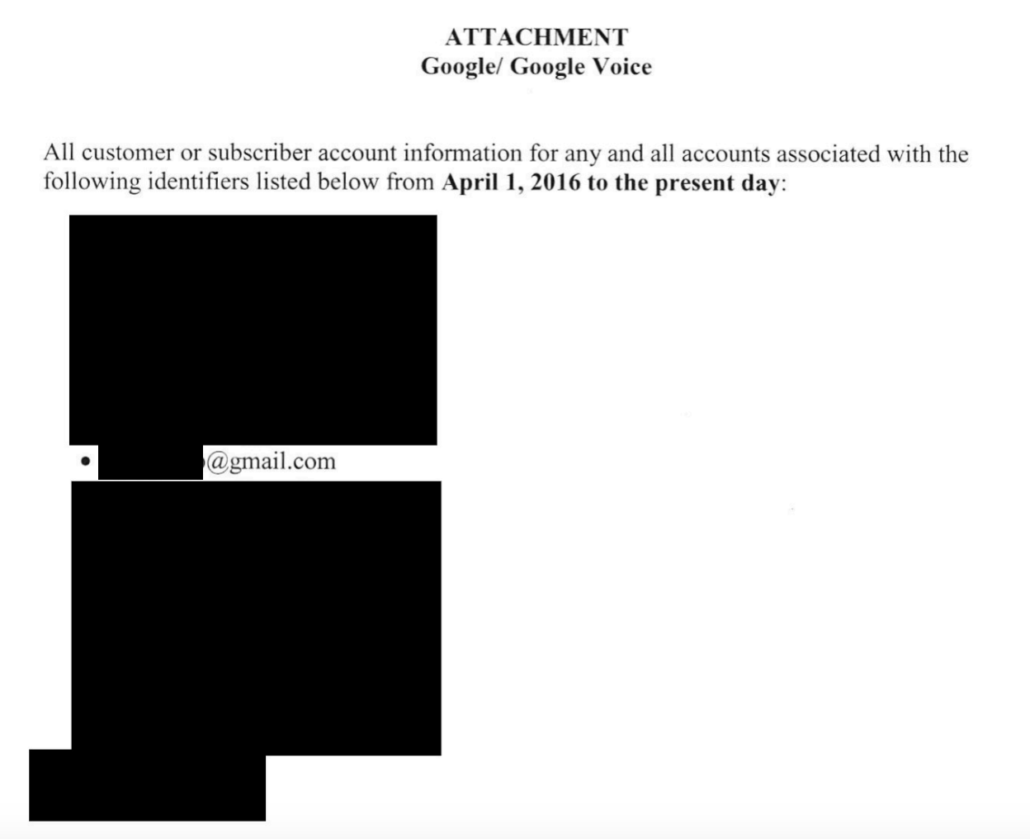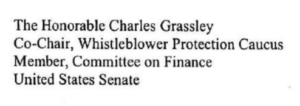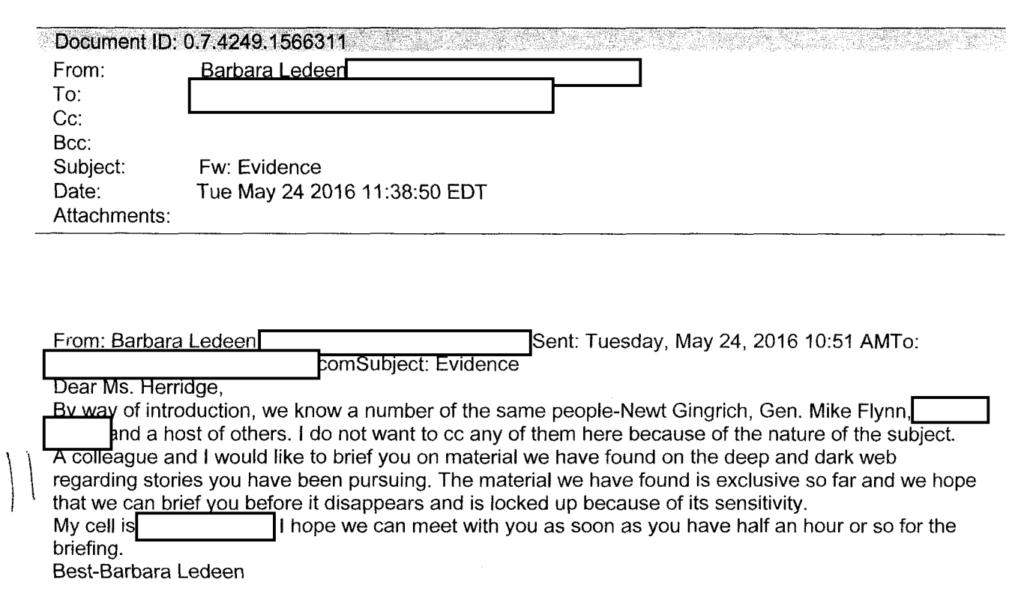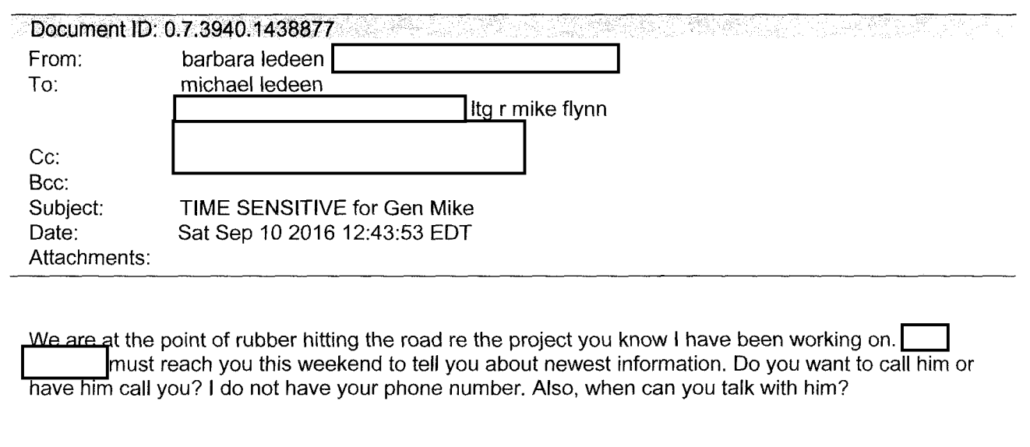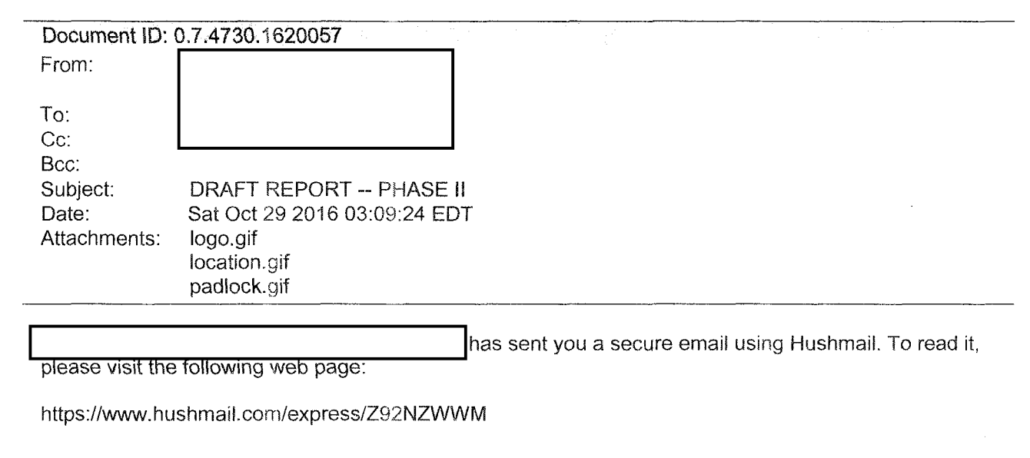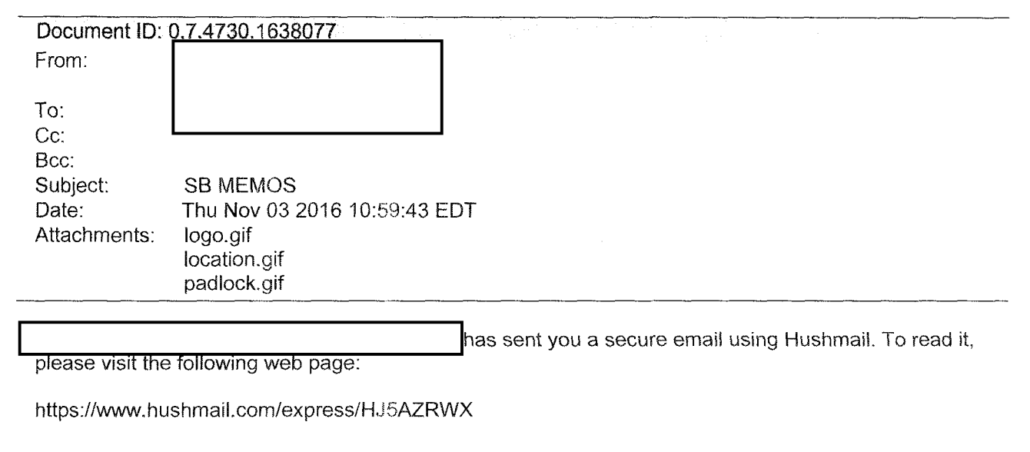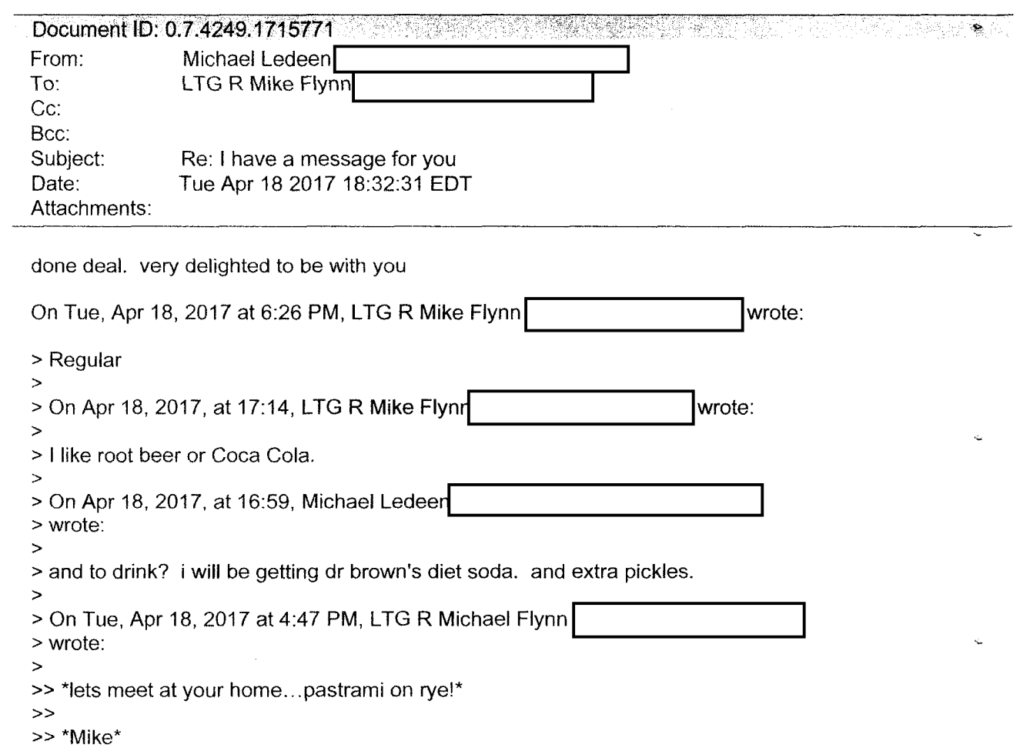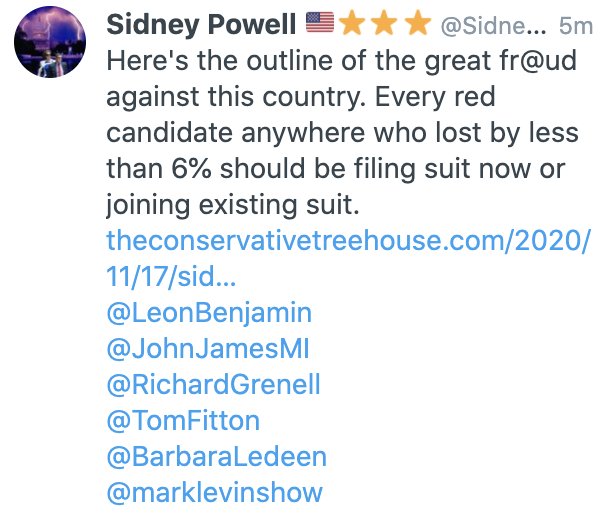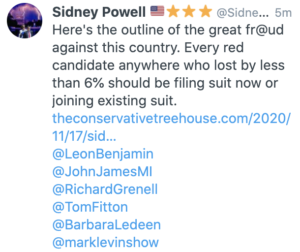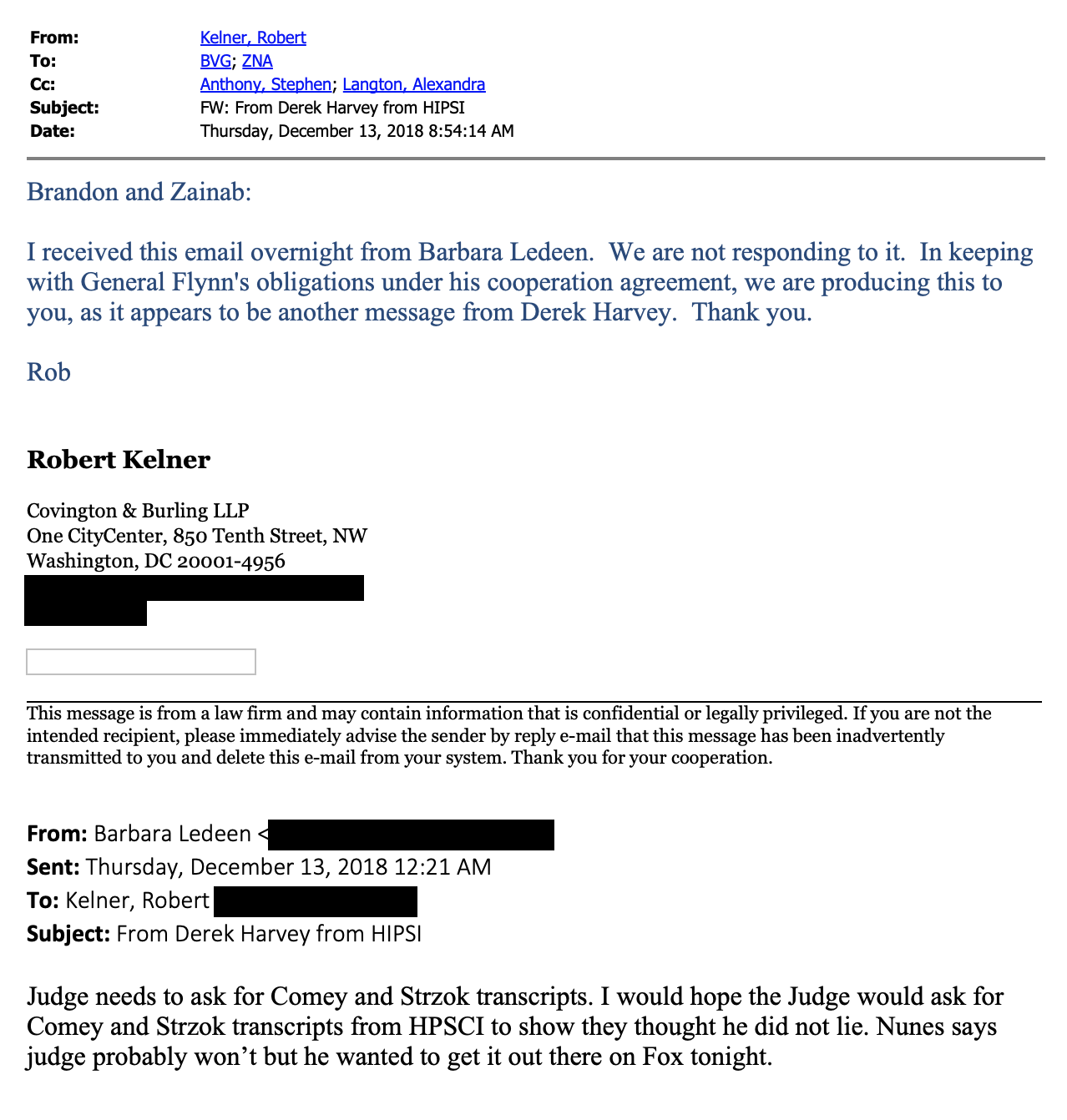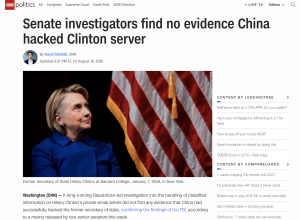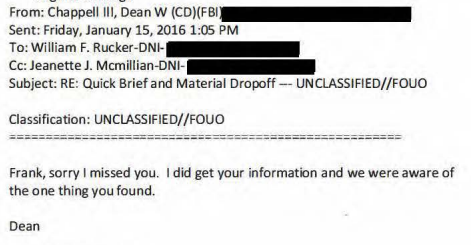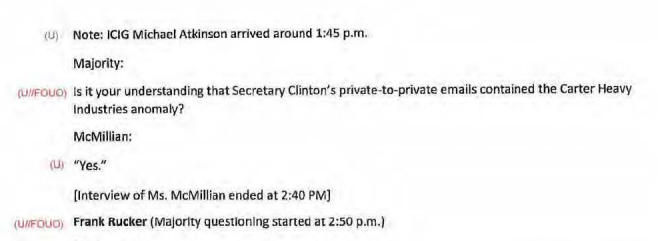Gary Shapley’s Handlers Revisit Past Leak Investigations into Chuck Grassley’s Staff
According to a press release on the website for Empower Oversight–the group handling Gary Shapley’s now-debunked media tour–Empower’s founder, Jason Foster, was the subject of an FBI subpoena to Google in 2017.
Google first alerted Foster to the September 12, 2017 subpoena on October 19, 2023. That’s one of the reasons I find this FOIA so interesting. The notice came more than six years after the subpoena, suggesting FBI likely continued to investigate someone tied to the investigation for at least a year longer than statutes of limitation would normally extend.
Empower seems to suggest there’s a tie between the subpoena and one served on Google pertaining to Kash Patel’s personal email two months later, on November 20, 2017, as does Margot “Federalist Faceplant” Cleveland in this propaganda piece reporting on the subpoenas. While Empower says that this subpoena asked for information on other staffers, it only cites Kash to substantiate its claim that other staffers had also gotten notice of a past subpoena (Cleveland does report that a HPSCI staffer was also included).
Empower Oversight has information indicating that the other accounts listed in the subpoena belonged to other staffers, both Republicans and Democrats, for U.S. House and Senate committees also engaged in oversight investigations of the Justice Department at the time pursuant to their authorities under the U.S. Constitution.
[snip]
Other former staffers have publicly referenced receiving similar notices, including former U.S. House of Representatives Permanent Select Committee on Intelligence (“HPSCI”) staffer Kashyap Patel.
They’re from the same grand jury (16-3). But they not only have different file numbers, but the one on Kash’s subpoena — that is, the later subpoena, by two months — has a lower file number, 2017R01887, as compared to 2017R01896.
Kash is suing roughly the same people over his subpoena as Empower is FOIAing: Empower is asking about former DC US Attorney Jessie Liu, Rod Rosenstein, his one-time Principal Associate Robert Hur (currently the Special Counsel investigating Joe Biden’s classified documents), and Ed O’Callaghan, who replaced Hur, along with then DOJ Spox Sarah Isgur. Kash is suing Liu, Rosenstein, Hur, and O’Callahan, plus FBI Director Chris Wray and the two AUSAs behind the subpoena.
There are problems with both of their target sets. For example, Liu wasn’t even sworn in as US Attorney until September 25, 2017 — after the Foster subpoena (though before the Kash one). So Empower’s suggestion that Liu had some influence on the subpoena on him is nonsense. Rosenstein wasn’t sworn in until April 26, 2017, almost five months after the request for conversations with the press starts.
Similarly, Ed O’Callaghan, whom Kash describes as, “the Principal Associate Deputy Attorney General for Mr. Rosenstein at the time in question,” didn’t move from the National Security Division to Rosenstein’s office until April 2018, after Hur was confirmed as US Attorney for Maryland and long after both the subpoena implicating Kash and his blow-up with Rosenstein. Though if these were really sensitive leak investigations, NSD may have had a role in them. (Empower includes NSD within its FOIA.)
Those details don’t seem to matter for their projects: both men appear to be using the subpoenas as an excuse to settle scores.
Kash, ever the conspiracy theorist, brought a Bivens claim insinuating that Rosenstein and others violated Kash’s Fourth Amendment rights because DOJ served a subpoena — something not requiring probable cause under the Fourth Amendment — to obtain the subscriber information for a list of around 14 identifiers, of which his personal email was just one. There’s nothing on the face of the subpoena to suggest that DOJ knew his email was tied to someone who was a Congressional staffer at the time of the subpoena (though again, Federalist Faceplant seems to know at least one other person listed was a staffer). In fact, the subpoena asked for contact information going back to April 2016, a year before Kash moved from DOJ to HPSCI, so it could have pertained to a leak internal to DOJ.
Nevertheless, Kash spins a tale where the November 2017 subpoena is in some way connected with what he claims is Rosenstein’s threat, over a month later, to subpoena HPSCI staffers.
5. The illegitimate grounds for the subpoena were made clear when, shortly after the FBI and DOJ previewed what would become the “Nunes Memo,” which outlined significant issues with FBI’s and the DOJ’s manner of opening and conducting the Crossfire Hurricane investigation, then-Deputy Attorney General Rod Rosenstein (“DAG Rosenstein”) threatened to subpoena the records of the House Permanent Select Intelligence Committee staff, including Mr. Patel, during a closed-door meeting about producing documents requested by the Committee for their investigation into DOJ’s and the FBI’s, its subagency, conduct in the Crossfire Hurricane investigation.
6. The Department of Justice attempted to defend against the allegation of this threat to Legislative Branch employees, but admitted, at a minimum, that DAG Rosenstein did threaten to subpoena records of Congressional staff in contempt proceedings over the DOJ’s noncompliance with multiple subpoenas. Regardless, this characterization was disputed by multiple Committee staffers, and the matter was referred to the House General Counsel and Speaker of the House as a threat to subpoena records of staffers to halt their investigation.
7. DAG Rosenstein made this threat in January of 2018, approximately one month after his Department of Justice had already subpoenaed Mr. Patel’s email records from Google. This confrontation establishes that DAG Rosenstein and other Defendants were searching for a reason to subpoena Mr. Patel’s official accounts as well as the personal ones that DOJ was already improperly pursuing.
Contrary to Kash’s claim, DOJ didn’t concede Rosenstein threatened to subpoena the HPSCI records. According to a Fox News article Kash himself cites in his suit, DOJ said that Rosenstein was advising staffers to retain their emails so he could use them to defend against any accusation of contempt. Though Rosenstein did threaten to ask the House General Counsel to investigate Kash and whoever else was involved.
A DOJ official told Fox News that Rosenstein “never threatened anyone in the room with a criminal investigation.” The official said the department and bureau officials in the room “are all quite clear that the characterization of events laid out here is false,” adding that Rosenstein was responding to a threat of contempt.
“The Deputy Attorney General was making the point—after being threatened with contempt — that as an American citizen charged with the offense of contempt of Congress, he would have the right to defend himself, including requesting production of relevant emails and text messages and calling them as witnesses to demonstrate that their allegations are false,” the official said. “That is why he put them on notice to retain relevant emails and text messages, and he hopes they did so. (We have no process to obtain such records without congressional approval.)”
Further, the official said that when Rosenstein returns to the United States from a work trip, “he will request that the House General counsel conduct an internal investigation of these Congressional staffers’ conduct.”
This all seems like a retroactive attempt to politicize the investigation into some contact Kash had, potentially even before he joined HPSCI with a lawsuit claiming a violation of the Fourth Amendment under Bivens for a subpoena for toll records that a former DOJ prosecutor, especially, should know are not entitled to any expectation of privacy.
Foster’s claim, which is only a FOIA, not a lawsuit, is a bit less ridiculous (so long as you ignore his demand for communications involving Liu before she started as US Attorney and Rosenstein before he was DAG).
He seems certain that the subpoena for his phone (which he says was used by his spouse) pertained to a leak investigation. He’s filing it to find out if Rosenstein’s office ever got the same scrutiny in leak investigations that (he seems sure) some Congressional staffers got in 2017.
It begs the question of whether DOJ was equally zealous in seeking the communication records of its own employees with access to any leaked information.
[snip]
(5) All communications exchanged between members of the press and DAG Rosenstein, Robert Hur, Edward O’Callaghan, Sarah Isgur, aka Sarah Isgur Flores, and/or Jessie Liu for the period from December 1, 2016 to September 26, 2017, regarding (a) communications between Michael Flynn and Sergey Kislyak, (b) Carter Page, (c) Joe Pientka, (d) Bill Priestap, (e) congressional oversight requests, (f) Senator Charles Grassley, (g) Jason Foster, and/or (h) the Crossfire Hurricane investigation.
(6)All grand jury subpoenas issued for personal communications of DAG Rosenstein, Robert Hur, Edward O’Callaghan, and/or Jessie Liu between May 1, 2017 and May 1, 2018.
(7) All communications exchanged between the U.S. Attorney’s Office for the District of Columbia, the National Security Division, the Deputy Attorney General’s Office and/or the FBI and Verizon between March 15, 2016, and the present regarding obtaining communications data associated with devices that Verizon serviced for U.S. House Representatives or U.S. Senate. [my emphasis]
The time range of the Foster subpoena, December 1, 2016 to May 1, 2017, covers the period of the known leaks about Mike Flynn and Carter Page — the former, especially, one of the leaks Republicans have never stopped bitching because it wasn’t charged. Yet here, a key Republican is complaining there was “no legitimate predicate” in investigating people who were briefed on information that subsequently got leaked.
There appears to have been an extensive and far-reaching effort to use grand jury subpoenas and perhaps other means to gather the personal communications records of innocent congressional staffers and their families with little or no legitimate predicate.
Empower’s mention of Carter Page also situates the subpoena temporally. The subpoena that included a number associated with Foster was served in precisely the same time period that — the Statement of the Offense and sentencing memo for James Wolfe case show — FBI was investigating the leak of the Carter Page FISA. DOJ opened that investigation in April 2017. They had shown enough probable cause against Wolfe to obtain a warrant to covertly image his cell phone by October 2017. No one complained that Wolfe was prosecuted for his presumed role in leaking some of these stories, and his prosecution alone shows that the subpoena had predicate.
Foster may have other specific stories in mind too: In addition to the leaked stories about Flynn undermining US foreign policy with the Russian Ambassador, the FOIA asks about other Russian investigation stories, including Joe Pientka, whose role in briefing Mike Flynn Grassley made into a personal crusade.
Curiously, the Steele dossier is not on here, even though that was another personal crusade of Chuck Grassley.
All that said, the timeline included in the FOIA is broader than that. Here’s how the various timelines overlap, or don’t:
- Scope of Foster subpoena: December 1, 2016 through May 1, 2017
- Rosenstein sworn in as DAG: April 26, 2017
- Date of Foster subpoena: September 12, 2017
- Jessie Liu sworn in as US Attorney: September 25, 2017
- Scope of Foster’s FOIA for DAG communications with the press: December 1, 2016 through September 26, 2017
- Date of Kash subpoena: November 20, 2017
- Scope of Kash subpoena: May 1, 2016 through November 20, 2017
- Scope of Foster’s FOIA for grand jury subpoenas targeting DAG: May 1, 2017 through May 1, 2018
- Scope of Foster’s FOIA for Verizon records of Congressional staffers March 15, 2016 through October 24, 2023
Foster is FOIAing Rosenstein’s office, first, for conversations with the press — including about him — starting on December 1, 2016, before Trump was inaugurated and months before Rosenstein was sworn in on April 26, 2017. He is FOIAing conversations with the press that continue through the day after Liu was sworn in September 2017, still months before O’Callaghan was part of DAG.
Then he’s asking for any grand jury subpoenas (which he knows would be protected under grand jury secrecy rules and so won’t get) from the end date of the subpoena targeting him, after which point both the Flynn and Page investigations were underway, until May 1, 2018 — still four months before Legistorm shows Foster leaving his SJC job on September 4, 2018, but perhaps not coincidentally ending before the time when the Mueller investigation started to more closely probe fellow SJC staffer Barbara Ledeen’s role in Mike Flynn’s 2016 rat-fucking and two weeks shy of an interview when Mueller asked Flynn about Ledeen’s investigation of the investigation. A September 17, 2018 interview asked very specific questions about people leaking claimed details of the investigation to Flynn, as well as Flynn’s contacts with unidentified Congressional staffers.
Again, this request is a test about whether Rosenstein’s office was targeted for leaks, but the leaks that Foster suggest this subpoena pertains to — Mike Flynn’s contacts with Sergey Kislyak and Carter Page’s FISA — happened before any of these people were in DAG. Foster seems interested in leaks about leak investigations, not the leaks themselves.
It’s the final bullet I find the most interesting though. None of the subpoenas he raises in his FOIA — not the subpoena of Kash’s personal email, not the subpoena of his own Google voice phone, and not the subpoena to Apple targeting HPSCI members — target official phone records. But Foster FOIAs for official records as well: All communications between DC USAO, NSD, DAG, and FBI with Verizon — communications that might be something other than a grand jury subpoena — about obtaining phone records for the Congressional devices serviced by Verizon. He’s asking for a much broader period of time, too: March 15, 2016 — early enough to include the start date of Kash’s subpoena, but also to include some of Barbara Ledeen’s rat-fucking with Mike Flynn — through the present, late enough to include any contacts in which Chuck Grassley staffers used their official devices to share information about the Hunter Biden investigation with the press.
This last request is not about Rosenstein; Rosenstein was only DAG for two of the seven and a half years covered by this part of the FOIA.
This FOIA is, on its face, totally uncontroversial (though it attempts to do with a FOIA what DOJ IG is already doing, which it notes). It purports to test whether Rod Rosenstein exempted his own top deputies from the kind of investigative scrutiny to which Rosenstein — always a leak hawk — subjected Congressional staffers. Hell, I’m fairly certain Rosenstein and his top deputies were key undisclosed sources for a bunch of bullshit comments (though most of them were false, and therefore not criminal leaks). Some of those anonymous comments were to the same stable of journalists who also happen to serve as mouthpieces for Chuck Grassley propaganda (and as such, Foster may have specific reason to believe that Rosenstein teed up journalists’ questions to or about him).
And the FOIA for contacts with Verizon gets at important separation of powers issues: under what terms the Executive Branch can investigate the official business of the Legislative Branch, including times when the Legislative Branch is screaming for investigations into leaks that probably (and provably, in the case of Carter Page) include Legislative Branch staffers.
But it also serves as a fishing expedition, by the entity that championed the now debunked claims of Gary Shapley, into potential investigations into transparent ongoing efforts by Chuck Grassley to release details of criminal investigations in the guise of oversight.
In a meeting agenda sent September 3, 2020, Joseph Ziegler included the Senate investigation led by Chuck Grassley and Ron Johnson among topics for discussion.
No later than December 2020, a document shared by Empower Oversight client Gary Shapley reveals, the IRS agents running this investigation cared more about catering to demands from Congress, including from Chuck Grassley, than preserving the investigation.
The USAO and FBI received congressional inquiries concerning this investigation and have repeatedly ignored their requests, openly mocking the members of congress who made the request.
Another document shared by Empower Oversight client Gary Shapley shows that, in May 2021, the IRS agents running the investigation continued to be aware of — and interested in catering to — requests from Congress.
The USAO and FBI received congressional inquiries concerning this investigation and it’s believed they have ignored their requests.
A document released by Empower Oversight client Gary Shapley reflecting a January 6, 2023 call with IRS’ Deputy Field Officer Michael Batdorf alerting him — among other things — that he expected the Delaware US Attorney to make “nefarious” allegations against him, also recorded that by the time, two days after he notified IRS and DOJ IG Inspectors General he was seeking formal whistleblower status which happens to have happened on the day the GOP took the House, his attorney had already, “participated in calls and/or meetings” with “the Congressional Judiciary committees.”
DFO asked about the process and Shapley responded that the Congressional Judiciary committees, OSC, IRS OGC and TIGTA have been notified and have participated in calls and/or meetings with my counsel.
Yet when one of Shapley’s attorneys, Mark Lytle, formally contacted the Chairs and Ranking Members of those same “Congressional Judiciary committees,” the Chairs and Ranking Members of the relevant finance committees, along with Chuck Grassley on April 19, 2023, he did not treat those contacts with the judiciary committees as protected disclosures. The letter mentions that Grassley is a member of the Finance Committee, but doesn’t mention that Grassley is a member and former Chair of the Judiciary Committee.
That was the first moment, publicly at least, that Empower Oversight client Gary Shapley sought protection to share IRS protected information with Congress. That is, even according to Lytle, if Shapley shared any IRS protected information — to say nothing of grand jury protected information — prior to that, by the plain terms of his letter it was not under a grant of protection.
A month after Gary Shapley’s claims — facilitated by Empower Oversight — were soundly debunked by his own documentation and his colleagues, Empower Oversight filed a FOIA that would, among other things, attempt to learn whether the FBI was conducting any investigation of leaks to the press from Chuck Grassley’s staffers, covering the period in 2016 when a Chuck Grassley staffer attempted to reach out to hostile intelligence services to find dirt on Hillary Clinton, the period when a Grassley staffer was seeding press stories — some that were fabrications — about the Russian investigation, and the period of time when those investigating Hunter Biden were more solicitous of requests from members of Congress like Chuck Grassley than they were in protecting the ongoing investigation.


